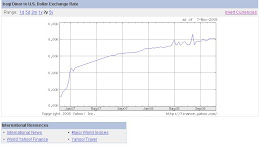After the U.S. deposed Saddam Hussein, the Sunni Arabs lost control of the government, the military, and the economy. Majority rule put a Shiite-Kurd coalition in charge, relegating Sunni Arabs to a third-tier cultural, economic and political status. From the Sunni Arab point of view, the situation has only worsened since Iraqi Prime Minister Nuri al-Maliki, a strict Shiite sectarian, has further increased his power as a result of the "Surge."
Stability and a lessening of violence cannot be fostered under sectarian rule that ignores the economic and political aspirations of Sunni Arabs. Many Sunnis resist a regional solution because most of the developed sources of oil and gas revenue come from lands occupied by Shiites and Kurds, in the south and north.
What is too often overlooked is that significant sources of untapped oil and gas wealth, some 100 billion barrels of oil, according to the U.S. energy consultancy IHS Inc, exist in Iraq's Western Desert in the Sunni Arab province of al-Anbar. Extraction cost for the oil is estimated as low as $1.50/barrel, among the lowest in the world. A recent book, The Geology of Iraq, written by 16 geologists with firsthand knowledge of the geology of Iraq, is more conservative but still estimates substantial resources in the region. The book's chief author is the internationally known geologist, Dr. Saad Z. Jassim.
Both the Shiites in the south and the Kurds in the north have viable oil economies, a source of wealth which the Sunni Arabs currently lack. Development of oil and gas along with self rule and the prospect of significant revenue from their own oil and gas fields could well be the enticement for the majority of Sunni Arabs to cease their efforts to destabilize an Iraq in which they feel they no longer have a stake.
Such a plan could well receive the support of a majority of Kurds and Shiites, who are attempting to focus on their own prosperity and development after years of upheaval and violence. Indeed, a majority of Kurds, as well as the prominent Shiite group, the Islamic Supreme Council of Iraq (ISCI), have long supported a federal solution.
Success, however, requires an economic rationale. For Sunni Arabs the carrot is the development of oil and gas projects pursued under the ownership of the Sunni Arab Tribal Confederation, the principal Sunni political alliance in Iraq. Such a project also provides Sunni insurgent groups with a major incentive to cease violent attacks against oil and gas pipelines and other targets which are seen as only enriching Shiites and Kurds.
Oil wealth has transformed the quality of life for Kurds, who already enjoy de facto autonomy. They currently negotiate contracts with foreign firms who develop and operate their oil fields and are in negotiation with the Maliki government to sell their oil independently.
In the interest of promoting stability in the region, the U.S. and other nations must pressure Maliki to allow the Sunnis to benefit from revenues generated by such development. Start up funds could come from agencies such as the United Nations Capital Development Fund, or development could be opened to competitive bidding by international or Mideast oil companies.
The benefits of developing oil and gas for the benefit of Sunni Arabs in their own lands would be felt throughout the world. The symbolism of the Sunni Arab Tribal Confederation negotiating oil and gas contracts would stamp out a major piece of anti-American propaganda -- that the U.S. is only in Iraq to secure oil. In the short run, the fledgling Sunni Arab economy would be buoyed by investment and jobs. Transportation of the oil and gas -- which could easily tap into an extensive Turkish energy grid -- could increase energy supplies to Europe, which is suffering under Russia's energy chokehold.
Success of such a plan will only be achieved when Arab Sunnis witness that oil and gas revenues are benefiting the lives of the native Sunni population. Local development in Sunni lands would be a major blow to al-Qaeda in Iraq, whose best recruiting tool has been unemployment, dislocation, despair and resentment. There is less violence and a greater willingness to coexist among people who see the possibility of a better and more prosperous future.
( AINA )

